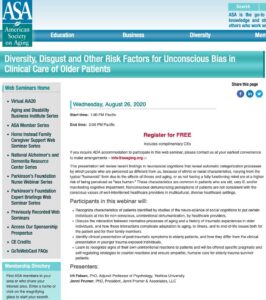On Wednesday August 26, I will be giving an online presentation with my colleague and friend Dr. Jenni Frumer. This online presentation was initially planned as a presentation at the “Aging in America” conference of the American Society on Aging (ASA) which was supposed to take place in Atlanta in March 2020, but had to be postponed due to the pandemic. The topics of the presentation will include the impact of emotional biases of healthcare providers on the quality of care provided to patients who are at particularly high risk of dehumanization. More details, and registration information for ASA members, can be found by clicking on the link below.
While the presentation itself is only open to ASA members, the recording will be made available to the public on the website of ASA later this year. I will announce on my blog once the recording is available.
There has never been a more opportune time to address some deeply-ingrained biases that impact our perceptions of others. These emotional biases are based on the differences between “us” and those whom we perceive as “Other”, because of the color of their skin, their race and ethnicity, their culture. This presentation will delineate the non-conscious sources of automatic social categorization processes, which helped our ancestors rapidly differentiate between friend or foe, thus increasing their chance of survival, during the early history of our species. Such social categorization processes are not suited to the modern, multi-racial, multi-cultural environment in which we live. However, our brains are still responding to cues that were built-in through the evolution of the human experience, and healthcare providers are not exempt from such unintentional, non-conscious emotional biases when they encounter patients, people who are at the most vulnerable times in their lives. As Fiske, a researcher who has contributed tremendously to the understanding of bias and dehumanization, stated:
“People do not necessarily ascribe a fully experiencing mind to the other and thus do not inevitably recognize that entity as fully human” (Fiske, 2009, pp. 31).
Our society is experiencing a time of profound social awakening, a time in which racism, anti-Semitism, anti-Asian sentiments, Islamophobia, and other forms of hatred of the “Other” have reared their ugly heads more openly, but also a time in which the call for systemic change has been raised more loudly than since the 1960’s.
The non-conscious roots of our biases can only be addressed when we become aware of them, and are willing to be non-defensive about them, and work to counter the unintentional impact they might have on the way we perceive others. We must learn how to train our brain to see the similarities among us, to emphasize “together” rather than the differences. Nowhere is such a recognition of our shared humanity more necessary than in the context of the relationships between patients and healthcare providers, the people who dedicate their careers to helping those in need.
Irit Felsen


Leave a Reply